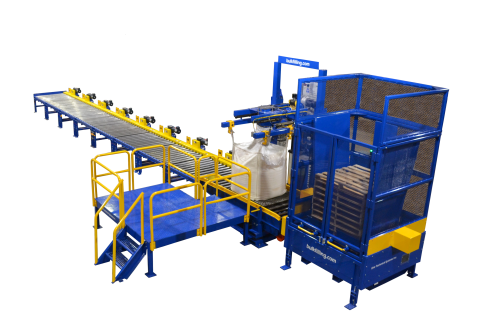Whether your dry bulk handling facility dispatches finished products or is an intermediary in a larger production process, bulk bag fillers are a crucial piece of equipment. Ultimately, dry bulk materials need a place to go — usually an FIBC (flexible intermediate bulk container) — and it's the bulk bag filler's job to put them there safely, efficiently, and effectively.
Bulk bag filling machines can be configured for manual, semi-automated, or fully automated setups, with loads (no pun intended) of customization options tailored to the needs of your handling operations. More complex, fully automated bulk bag filling systems may involve more expense upfront, but may save you money in the long run by minimizing product loss, limiting downtime, and upping productivity.
What kind of bulk bag filling equipment do you need? Let's discuss.
Anatomy of a bulk bag filler
Bulk bag fillers in their most elemental form must consist of a few basic components:
- A support frame or structure
- Bag support in the form of bag loop arms connected to the frame or a pallet placed underneath.
- The filling nozzlehead or spout
- An inflatable neck seal and retaining ring to securely maintain a seal between the discharge equipment (e.g. a hopper) and the bag opening as the FIBC is being filled.
Many bulk bag filling systems will add components for dust extraction, weighing, vibration/packing, and bag removal/changeout.
Questions you should ask yourself before buying
Before investing in bulk bag filling equipment, there are some very important things to consider:
- What is the maximum volume or capacity my facility can currently handle, as dictated by physical dimensions, existing setup, and labor availability?
- Do I anticipate higher demand and/or growth in the future?
- What kind of dry bulk material am I processing? How free-flowing is it? Does it come with any safety concerns? Is it subject to any sanitary regulations?
- Are bag setup and changeout something I am comfortable with my employees repeatedly doing, or should I automate it? (i.e. Is there any risk/liability to doing things manually?)
- Does my process involve containers other than FIBCs?
Now that we've got you thinking, let's delve into the bulk bag filling solutions offered by Erie Technical Systems.
DustMAX: [$3,000 and up]
What it is: The DustMAX is a simple, economical bag filling frame equipped with the bare essentials.
Who it's right for: Facilities with low packaging rates, wherein bag change is infrequent (i.e. where manual changeover doesn't pose a major inconvenience/issue).
Applications: Dry bulk solids, aggregate, dust/process byproducts, food
Customizations: Integral weigh scale [$3,000], pneumatic/electric slide gate valve [$6,000], product surge hopper [$15,000]
ValuMAX: [$9,000 and up]
What it is: The ValuMAX bulk bag filling station offers upgraded functionality compared to the DustMAX, but is still designed with economy in mind. The bag bulk bag sits on a pallet and is strapped to two adjustable arms. The ValuMAX is open from the front to allow forklift access for pallet changeout.
Who it's right for: Lower to mid-throughput operations that can afford some degree of manual oversight. The adjustable arms allow for some flexibility in bag size (35"x35"x35" up to 48'x48"x55").
Applications: Dry bulk solids, aggregate, dust/process byproducts, food
Customizations: Integral weigh scale [$3,000], pneumatic/electric slide gate valve [$6,000], product surge hopper [$15,000]
DensiMAX: [$60,000 and up]
What it is: The DensiMAX bulk filling system offers significantly expanded versatility compared to our lower-volume solutions, with the ability to simultaneously fill, vibrate, and weigh not only FIBCs, but also bulk boxes, totes, and drums with varying degrees of automation.
Who it's right for: Higher volume operations wherein a finer degree of control and customization is needed. A modular design means your system can grow with you.
Applications: Virtually any dry bulk handling application — Erie Technical Systems will evaluate your material in its test lab to help determine the best configuration.
Customizations: Can be integrated with PalletMAX pallet dispensers [$40,000+], pallet stackers [$40,000+], pallet handling conveyors [$10,000], feed devices [$10,000+], and programmable logic controllers [$10,000+]
SysteMAX: [$80,000 and up]
What it is: Going beyond a bulk bag filling station, SysteMAX is a complete packaging line custom-engineered and built to your exacting standards. The DensiMAX bulk bag loader forms its core, with conveyors and other supporting equipment added to form a fully automated bulk bag filling system, with an intuitive operator touch screen interface for real-time insights and control.
Who it's right for: Large-scale, high-volume processors and manufacturers who value accuracy, efficiency, and scalability.
Applications: Everything and anything in the dry bulk materials category — components are completely customized to you.
Customizations: Label printing devices [$3,000+], bar code scanners [$1000+], product storage hoppers [$15,000+], flow control valves [$6,000+], stretch wrappers [$80,000+], and almost anything else you can think of.
Bulk bag filling systems from Erie Technical Systems
The right kind of bulk bag filler for you ultimately depends on who you are, what you do, and what you can afford. With these considerations in mind, the Erie Technical Systems team will collaborate with you closely to determine the bulk bag filling equipment that makes the most sense for your application and budget.

